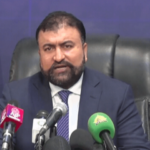ISLAMABAD, Sep 15 (APP): The outcomes of Pakistan’s GSP+ status conferred by the European Union (EU) has started bearing positive outcomes amid growing exports to the EU by 82% whereas the trade incentive scheme would be revised soon with increase in demand on compliance of international conventions.
Head of Rural Development and Economic Cooperation, European Union Delegation Dr Stephen Langrell made these remarks at a seminar highlighting green practices in Pakistan’s industrial sector, a news release said.
The European Union (EU) has been supporting sustainable and green inclusive growth in Pakistan through its project titled ‘International Labour and Environmental Standards Application in Pakistan’s SMEs (ILES) which is being jointly implemented by Worldwide Fund for Nature (WWF-Pakistan) and International Labour Organization (ILO) since 2016. Each year the EU provides €100 million to Pakistan in grants for development and strengthening cooperation.
Speaking at the seminar Dr Stephen Langrell said despite promising outcomes of the generalised scheme of preferences plus (GSP+), the status for Pakistan was set to be revised soon, and would demand compliance with 32 core international conventions, which were previously 27.
“Therefore, the reporting mechanisms for SDG-12 and global multilateral environmental agreements (MEAs) by WWF-Pakistan are very timely and useful, which could improve Pakistan’s reporting at the international level.”
He also added that it might provide opportunities for new ideas regarding sustainability and circularity which could improve the overall profile of Pakistan’s industrial sector.
Director General Ministry of Climate Change, Mohammad Saeed Ashraf Siddiqi fully endorsed the environmental component of the ILES program which promotes compliance with the environmental standards.
He also stressed the need for promoting resource efficiency through dashboards, calling for collaborative approaches and joint efforts by all public and private sector stakeholders.
Senior Director Footprint, WWF-Pakistan Dr. Masood Arshad added that WWF-Pakistan was working for the conservation of natural resources and pollution reduction in Pakistan’s textile and leather sectors. The toolkits developed would encourage the private sector to report their best practices at the pilot scale and initiate a healthy competition.
Head of Freshwater Programme at WWF-Pakistan, Sohail Ali Naqvi while introducing the dashboard for SDG-12 apprised the audience that the success stories of environmental compliance of 75 Small and Medium Enterprises (SMEs) under ILES can be linked to the National Action Plan for Sustainable Consumption and Production for its effective implementation.
The seminar was attended by stakeholders from the public and private sector organizations who actively took part in the discussion.






